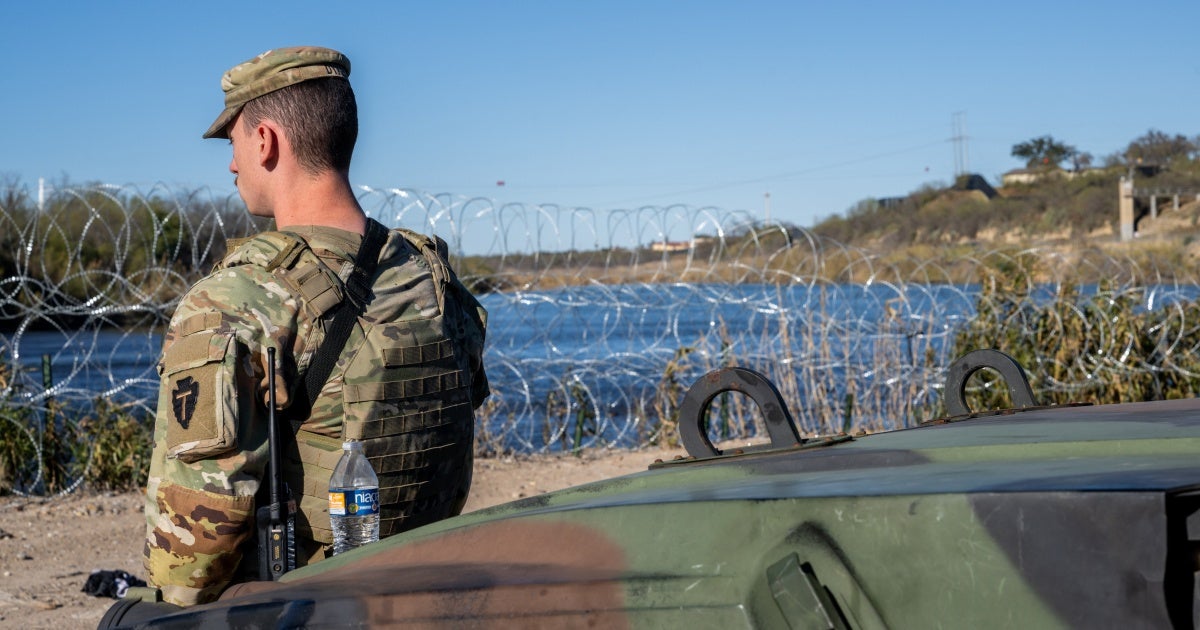(Austin, TX) – The Texas National Guard has repeatedly fired pepper spray projectiles at arriving migrants, Human Rights Watch said today. The Texas legislature should deny additional funds for the Texas Military Department, which oversees the Texas National Guard, until this practice ends.
In several incidents, including one newly documented by Human Rights Watch, Texas National Guard members fired pepper spray projectiles—often shaped like a ball, containing pepper irritants, and fired from a launching gun—on arriving migrants not engaged in threatening acts, including women and children. The National Guard is at the border as part of Operation Lone Star, Texas’ troubled border policing program that has thus far cost more than $11 billion.
“In separate incidents this summer, witnesses saw Texas National Guard members firing pepper spray projectiles at migrants who posed no risk to national guard members or anyone else,” said Bob Libal, Texas consultant at Human Rights Watch. “The Texas legislature should respond by increasing its oversight over the Texas Military Department and denying funding increases to the department until these abuses stop.”
The Texas Military Department adjunct general, Thomas Suelzer, told the Texas Senate Border Security Committee on June 11, 2024, that “for the Texas Military Department, force may be used for self-defense or the defense of others but must be the minimum level prescribed by the situation and proportional to the situation.” He further said Texas Military Department soldiers are trained not to fire directly at people. “We specifically train them, do not shoot directly at the individual.”
However, on September 7, three witnesses interviewed by Human Rights Watch said they saw a Texas National Guard member in a boat fire four or five times at a migrant who had crossed onto the United States side of the Rio Grande river, near Shelby Park in Eagle Pass, Texas. The witnesses said the migrant was in or near the razor wire on the US side of the river and did not do anything threatening.
The witnesses said the projectiles directly struck the migrant, who fell, did not get up, and did not receive aid from the soldiers nearby. The witnesses, who were viewing the incident from a park in Piedras Negras, Mexico, asked people in the United States to call 911 to attempt to help the migrant because calls from Mexico usually do not connect with US emergency services.
Josie Rodrigues, an Eagle Pass resident, was among those who witnessed the incident while visiting Piedras Negras. “I saw a national guardsman in the boat train his gun on the man and then he pepper balled him,” she said. “He shot him four or five times. I saw the puffs of smoke and the man went down, and he didn’t get up again. It looked to me like they were aiming at the person, not around him or at his feet. It was disturbing.”
In a separate incident on August 5, a group of migrants, including children, alleged that projectiles were shot at them and caused their eyes to burn. A local media account said that the Border Patrol denied involvement in the incident and said that the Texas National Guard was in control of the location where the incident was alleged to have occurred.
Under international human rights law, law enforcement may only use force—including less lethal weapons like pepper ball projectiles—when strictly necessary and proportionate to a legitimate aim. The UN Guidance on Less Lethal Weapons in Law Enforcement states chemical irritants should only be used where there is an “imminent risk of injury.”
Human Rights Watch contacted the Texas Military Department on September 19 to inquire about the use of pepper spray projectiles, including how many times national guard members have used them, how many injuries have occurred, and what policies govern their usage. The Military Department responded on September 24 with instructions to file a public records request.
In June, Human Rights Watch wrote to the civil rights division of the US Department of Justice to raise concerns about reports that national guard members had shot migrants and journalists with pepper spray projectiles, resulting in injuries and bruises, including on the mornings of May 28 and May 30, and may have physically assaulted several migrants, including beating to death one migrant man in El Paso, Texas, on May 17. The Department of Justice has not responded.
In June, an unidentified Texas Military Department official was quoted in USA Today, saying Texas National Guard soldiers had been trained to fire pepper spray projectiles with the objective of saturating the ground to deter migrants and asylum seekers from approaching the border. The official reportedly said that walking over the pepper spray projectiles is like “climbing through a jalapeño bush.”
The Texas Legislative Budget Board is meeting in Austin on September 25 to consider the Texas Military Department’s request to increase appropriations from $2.542 billion during the 2023-2024 biennium to $2.546 billion during the 2025-2026 biennium.
Earlier in September, the Washington Office on Latin America (WOLA) documented reports of abuse by Texas law enforcement and National Guard under Operation Lone Star, including firing kinetic impact projectiles (commonly called rubber bullets) and pepper spray projectiles, beatings, and pushing people into concertina wire.
Human Rights Watch has previously documented the impact of Operation Lone Star and found that the program, while failing to reach its stated aim to “deny Mexican Cartels and other smugglers the ability to move drugs and people into Texas,” has led to injuries and deaths, racial discrimination, abusive detention conditions, and a chilling effect on freedoms of association and expression.
The largest part of the Texas Military Department’s budget request—$2.3 billion for the 2025-2026 biennium—would fund the state’s National Guard forces deployed under a disaster provision. Since 2021, Governor Greg Abbott has declared a disaster to send thousands of troops and law enforcement officers to the border under Operation Lone Star.
“These incidents show a reckless disregard for the welfare and rights of people at the border,” Libal said. “The Texas legislature has a duty to provide oversight to the Texas military, and it should open an investigation into the use of pepper spray projectiles against defenseless people.”



